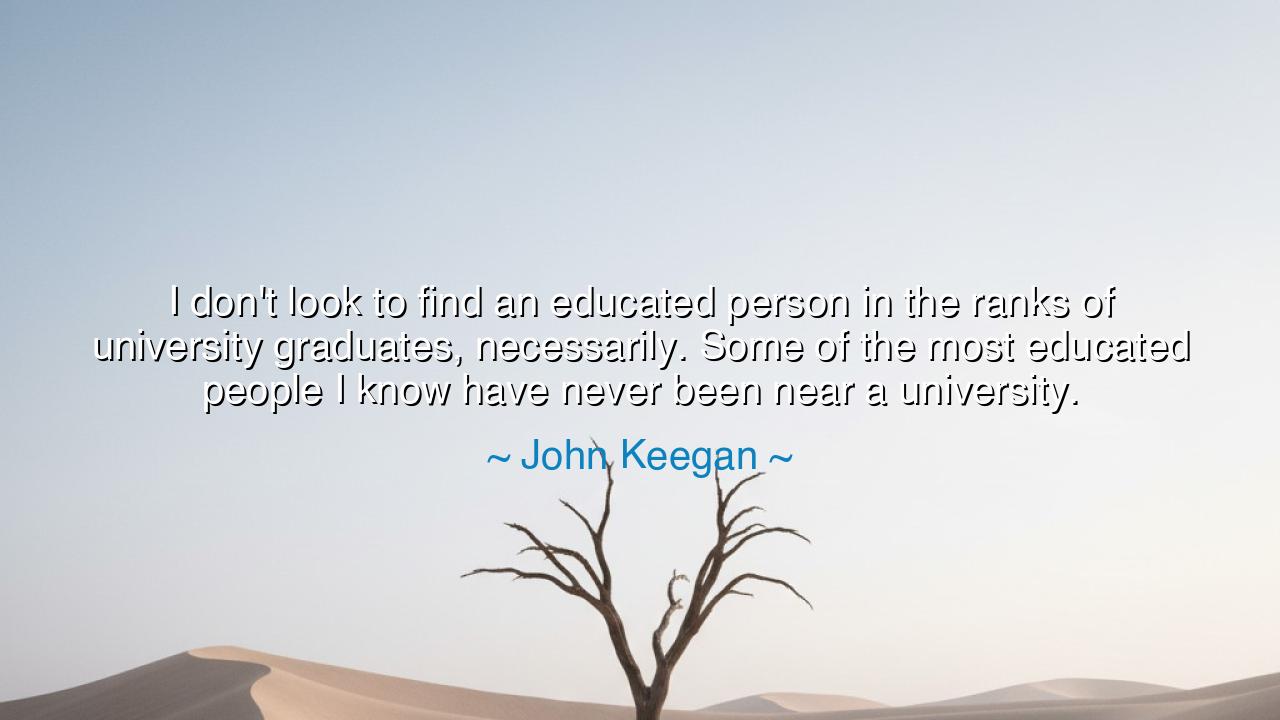
I don't look to find an educated person in the ranks of
I don't look to find an educated person in the ranks of university graduates, necessarily. Some of the most educated people I know have never been near a university.






The words “I don’t look to find an educated person in the ranks of university graduates, necessarily. Some of the most educated people I know have never been near a university” spoken by John Keegan strike at the heart of a profound truth: that education is not synonymous with formal schooling, nor is wisdom measured solely by degrees and certificates. Beneath this observation lies a timeless insight, that the cultivation of the mind, character, and understanding arises from engagement with the world, reflection upon experience, and the pursuit of knowledge in its many forms. Keegan reminds us that true learning is both active and expansive, and cannot be confined to the walls of an institution.
In the style of the ancients, one might hear echoes of Socrates or Confucius, who taught that wisdom is found in inquiry, reflection, and virtue, not in the accumulation of credentials. The university is but one avenue of knowledge, and the mind that seeks understanding is unbounded by walls or syllabi. Keegan’s statement emphasizes that education is measured by curiosity, discernment, and comprehension, rather than by the superficial trappings of status or formal achievement. The world itself, in its complexity and challenge, becomes the true classroom for those willing to learn.
The origin of this insight lies in Keegan’s life as a military historian and observer of human behavior in conflict. He witnessed firsthand that courage, strategic understanding, and the ability to grasp the complexities of warfare were not confined to formally educated generals or academics. Rather, the most insightful thinkers were often those who had learned through experience, observation, and rigorous self-directed study, demonstrating that intellectual depth can be cultivated outside formal institutions.
History provides numerous examples that illuminate this principle. Consider Leonardo da Vinci, who, though receiving some early schooling, largely educated himself through observation, experimentation, and insatiable curiosity. Similarly, Abraham Lincoln, largely self-taught, rose from humble beginnings to become one of the most revered statesmen and thinkers of his time. Like Keegan’s observation, these lives illustrate that formal education is not the sole gateway to knowledge, wisdom, or insight; dedication, reflection, and engagement with reality can cultivate minds as sharp and profound as any university graduate.
Keegan’s words also carry a critique of social assumptions. Society often equates diplomas with intelligence, yet many who have never set foot in a university surpass their formally educated peers in insight, judgment, and understanding. This observation reminds us that learning is a lifelong pursuit, one measured not by credentials but by the application of knowledge, the depth of reasoning, and the cultivation of moral and intellectual character.
Dear listener, the lesson is timeless: seek wisdom wherever it may be found, and value experience, reflection, and curiosity as much as formal study. Do not assume that the trappings of education guarantee understanding, nor that lack of formal schooling signals ignorance. The mind that engages, questions, and reflects is the mind truly educated, regardless of institutional affiliation.
Take this wisdom into your own life: pursue learning actively, read widely, observe keenly, and engage deeply with the world. Seek mentors, explore ideas, and cultivate discernment, for knowledge is born of curiosity and application, not merely attendance or certificates. Recognize that every experience, challenge, and reflection contributes to true education.
Finally, let John Keegan’s words resonate as both guidance and inspiration: an educated person is defined by thought, insight, and understanding, not by degrees or formal titles. Honor curiosity, value lived experience, and cultivate the mind in every aspect of life. By doing so, you join the ranks of the truly educated — a society of thinkers, observers, and wise actors capable of shaping the world through intellect, judgment, and discernment.






AAdministratorAdministrator
Welcome, honored guests. Please leave a comment, we will respond soon